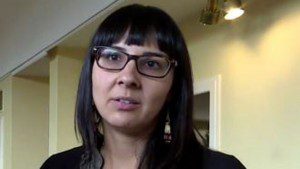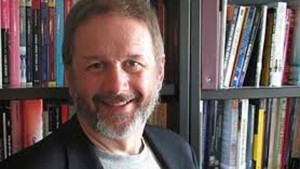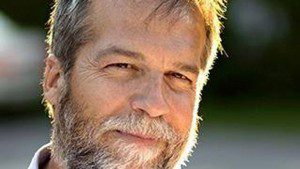Brandi Morin
APTN National News
A defender of the land from the Athabasca Chipewyan First Nation in Alberta is warning that Canada and the world had better take the climate change talks in Paris seriously or deal with a fate similar to Syria.
Eriel Deranger, who is heading to the United Nations talks on the environment and climate change in Paris later this month, told APTN that if something isn’t done about the problem, tensions will run high.
“It’s climate change that brought that country (Syria) to its knees,” said Deranger.

A report released by the National Academy of Science in May suggests that Deranger may not be far off.
According to the study’s authors, climate change contributed to the civil war in Syria and sites studies that show it may increase conflict around the world.
“We conclude that human influences on the climate system are implicated in the current Syrian conflict,” wrote authors of Climate change in the Fertile Crescent and implications of the recent Syrian drought released in May.
Read the report: Climate change in the Fertile Crescent and implications of the recent Syrian drought
The study notes that the Syrian conflict, which has killed more than 200,000 people and effected half its population of 22 million, is multifaceted.
“An abundance of history books on the subject tell us that civil unrest can never be said to have a simple or unique cause,” the report states. “The Syrian conflict, now civil war, is no exception.”
But the authors set out a timeline that includes poor Syrian policies around water and land use mixed with dry conditions creating the worst drought in country’s recorded history and suggests the unrest began then.
“In 2008, after the driest winter in Syria’s observed record, wheat production failed … small and medium-scale farmers and herders suffered from zero or near-zero production, and nearly all of their livestock herds were lost,” the report states.
The drought was also the longest in Syrian history and forced an estimated 1.5 million people off the land to live on the periphery of Syria’s cities. Also arriving at that time were nearly 1.5 million Iraqi refugees. Both arrived to cities ill-equipped to deal with that size of migration.
“The total urban population of Syria in 2002 was 8.9 million but, by the end of 2010, had grown to 13.8 million, a more than 50 per cent increase in only 8 years,” the report states. “The rapidly growing urban peripheries of Syria, marked by illegal settlements, overcrowding, poor infrastructure, unemployment, and crime, were neglected by the Assad government and became the heart of the developing unrest. Thus, the migration in response to the severe and prolonged drought exacerbated a number of the factors often cited as contributing to the unrest, which include unemployment, corruption, and rampant inequality.”
Eriel Deranger believes the same sort of circumstances could unfold in Canada one day, should nothing be done to address the mounting issues of climate change.
Athabasca Fort Chipewyan First Nation in Northern Alberta is located upstream from the tar sands.
The community has been struggling to find the right balance between economic participation with industrial development, while bearing the brunt of the environmental effects of the latter like pollution, contamination of the water, lands and wildlife.
With rural Indigenous People experiencing the ramifications of climate change they’re canaries in a coal mine, explained Deranger.
“I guarantee you when it comes to climate change and Indigenous People’s rights, if we don’t do something about it, how many Indigenous communities in the north and the arctic, in rural settings that are reliant on an intact eco system are going to move to the city centers,” said Deranger. “What does that do to the structures that we currently have in place?”
There were already several underlying factors that contributed to the Syrian conflict, said Dr. Rob Huebert, professor of political science and strategic studies at the University of Calgary.

In addition to the authoritarian regime of the Bashar Al-Assad, the Arab Spring uprising across the Middle East was the catalyst for the current war in Syria, said Huebert.
“You saw individuals that were advocating to have a more open and democratic society. There were many groups that saw an opportunity to overthrow these authoritarian leaders,” said Huebert. “Everything that I’ve seen suggests it was the ongoing tensions between the Sunnis and Shiites over authoritarian versus non-authoritarian governments, over the fact that you’ve got major powers supporting any belligerence that they seem to be able to see. So all of that seems to be much more likely than climate change.”
In regards to the migration of rural populations to urban areas, Huebert said it’s a trend seen worldwide from people seeking better economic opportunities and not necessarily linked to climate change.
“It’s exasperating a process that is already well underway worldwide. People just want better jobs in urban centers,” said Huebert.
But one of Canada’s top security experts believes that climate change can have very negative effects on society.
Phil Gurski is a former analyst with the Canaddian Security Intelligence Service.
According to Gurski, climate change can and has in some parts of the world, rendered landscapes uninhabitable and forced groups of people to find alternate places to live.
But he was quick to point out that climate change or anything else for that matter doesn’t cause radicalization such as seen in terrorist groups in Syria.
“The bottom line is nothing causes radicalization,” said Gurski. “I think what can happen is that things like climate change can establish conditions under which radicalization can take place.”

He said anyone has the potential to become radicalized, however it’s easier to perpetuate under certain social conditions.
“I think because of the effects of climate change people can find themselves in situations where in fact individuals can take advantage of those situations to start introducing ideologies. I do think that people who find themselves out of their ordinary circumstances (such as being displaced due to climate change) could in fact, therefore be in new circumstances in which radicalization can occur, but it’s not a causation effect it’s a correlation effect,” he said.
Gurski added that he thinks the new Trudeau administration will be focusing on implementing preventative measures so that crisis due to issues like climate change will be addressed well before they unfold.
But Deranger said there are already plenty of mounting challenges experienced by Indigenous people in Canada that climate change could further inflame.
“What needs to be incorporated into the solutions is how do we address the human and social, and particularly for me, the Indigenous rights abuses- the protection of those rights.”
There are First Nations communities already seeing destruction to their lands, but are hardly aware of the coming implications caused by climate change, according to Deranger, because they are kept in a constant state of crisis.
“We are more concerned about what’s happening directly on our lands from industrial development, what’s happening in our communities for the education of our youth, the social fabrics of our communities, there’s substance abuse, domestic violence. So, it becomes difficult for us to see behind the confines that the government has put us in on our reserves.”
Deranger heads to Paris at the end of November as a fully accredited participant to the COP21 United Nations discussions on creating a global climate change strategy.
Her main goal is to push for the recognition of Indigenous Peoples rights in the conversation.










